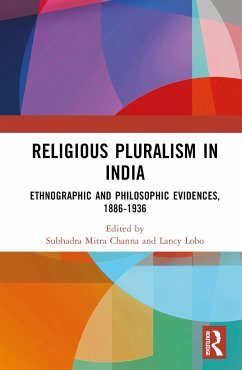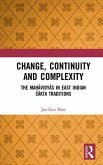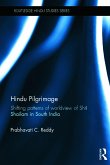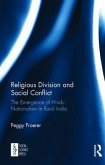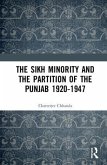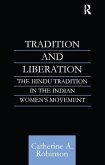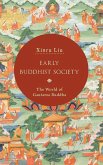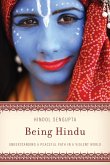Religious Pluralism in India
Ethnographic and Philosophic Evidences, 1886-1936
Herausgeber: Channa, Subhadra Mitra; Lobo, Lancy
Religious Pluralism in India
Ethnographic and Philosophic Evidences, 1886-1936
Herausgeber: Channa, Subhadra Mitra; Lobo, Lancy
- Gebundenes Buch
- Merkliste
- Auf die Merkliste
- Bewerten Bewerten
- Teilen
- Produkt teilen
- Produkterinnerung
- Produkterinnerung
This volume explores the inherent pluralism of Hinduism through ethnographic and philosophical evidence as presented in the Journal of Anthropological Society of Bombay. The essays dated 1886-1936, represent a period that marked the emergence of a European-educated native intelligentsia with a rationalist outlook.
Andere Kunden interessierten sich auch für
![Change, Continuity and Complexity Change, Continuity and Complexity]() Jae-Eun ShinChange, Continuity and Complexity202,99 €
Jae-Eun ShinChange, Continuity and Complexity202,99 €![Hindu Pilgrimage Hindu Pilgrimage]() Prabhavati C ReddyHindu Pilgrimage213,99 €
Prabhavati C ReddyHindu Pilgrimage213,99 €![Religious Division and Social Conflict Religious Division and Social Conflict]() Peggy FroererReligious Division and Social Conflict203,99 €
Peggy FroererReligious Division and Social Conflict203,99 €![The Sikh Minority and the Partition of the Punjab 1920-1947 The Sikh Minority and the Partition of the Punjab 1920-1947]() Chhanda ChatterjeeThe Sikh Minority and the Partition of the Punjab 1920-1947206,99 €
Chhanda ChatterjeeThe Sikh Minority and the Partition of the Punjab 1920-1947206,99 €![Tradition and Liberation Tradition and Liberation]() Catherine A RobinsonTradition and Liberation130,99 €
Catherine A RobinsonTradition and Liberation130,99 €![Early Buddhist Society Early Buddhist Society]() Xinru LiuEarly Buddhist Society99,99 €
Xinru LiuEarly Buddhist Society99,99 €![Being Hindu Being Hindu]() Hindol SenguptaBeing Hindu29,99 €
Hindol SenguptaBeing Hindu29,99 €-
-
-
This volume explores the inherent pluralism of Hinduism through ethnographic and philosophical evidence as presented in the Journal of Anthropological Society of Bombay. The essays dated 1886-1936, represent a period that marked the emergence of a European-educated native intelligentsia with a rationalist outlook.
Hinweis: Dieser Artikel kann nur an eine deutsche Lieferadresse ausgeliefert werden.
Hinweis: Dieser Artikel kann nur an eine deutsche Lieferadresse ausgeliefert werden.
Produktdetails
- Produktdetails
- Verlag: Taylor & Francis
- Seitenzahl: 210
- Erscheinungstermin: 31. März 2023
- Englisch
- Abmessung: 234mm x 156mm x 14mm
- Gewicht: 490g
- ISBN-13: 9781032373058
- ISBN-10: 1032373059
- Artikelnr.: 66731523
- Herstellerkennzeichnung
- Libri GmbH
- Europaallee 1
- 36244 Bad Hersfeld
- gpsr@libri.de
- Verlag: Taylor & Francis
- Seitenzahl: 210
- Erscheinungstermin: 31. März 2023
- Englisch
- Abmessung: 234mm x 156mm x 14mm
- Gewicht: 490g
- ISBN-13: 9781032373058
- ISBN-10: 1032373059
- Artikelnr.: 66731523
- Herstellerkennzeichnung
- Libri GmbH
- Europaallee 1
- 36244 Bad Hersfeld
- gpsr@libri.de
Subhadra Mitra Channa is retired Professor, Department of Anthropology, University of Delhi, India. Her research interests are in Gender Studies, Marginalization, Identity Studies, Urban Ethnography, Environment, Cosmology, and Religion and Caste Studies in India. She is the recipient of Charles Wallace Fellowship, the United Kingdom; Fulbright Lecturer, the United States, 2003 and 2008-2009; Visiting Professor to Maison D'Sciences De L'Homme, Paris; Visiting Scholar, University of Kentucky, the United States (2015); Visiting Professor University of Bahia, Brazil (2019); Fellow of the Society for Applied Anthropology, the United States; President of the Indian Anthropological Association (1997-2000); and S. C Roy Gold Medal (Asiatic Society). She was awarded the Distinguished Teacher Award Delhi University, in 2016, as the best teacher of the university. She is the present Senior Vice-President of (IUAES) from 2018 and Chair of the Commission on Marginalization and Global Apartheid (2017-2021). Her publications were Gender is South Asia; Life as a Dalit (ed.), The Inner and Outer Selves; Gender, Livelihood and Environment (ed.) with Marilyn Porter, and Anthropological Perspectives on Indian Tribes (2019), more than 80 scholarly papers. Lancy Lobo holds a master's degree in Anthropology and a doctoral degree in Sociology from the Delhi School of Economics, University of Delhi, India. He has authored and co-authored 25 books and scores mimeographs based on research over 40 years. He has been a professor and the Director of Centre for Social Studies, based in Surat, an institute under the Indian Council of Social Science Research, Delhi. He was International Visiting Fellow at the Woodstock Centre, Georgetown University, Washington, DC, in the year 1999-2000. He is the founder director of Centre for Culture and Development, Vadodara, completing 20 years. Currently, he is Professor Emeritus at the Indian Social Institute, Delhi. Some of his recent publications include, with Jayesh Shah (eds.), The Legacy of Nehru: Appraisal and Analysis (2018), with A.M. Shah (eds.), Essays on Suicide and Self-Immolation (2018), with Kanchan Bharati (eds.), Marriage and Divorce in India: Changing Concepts and Practices (2019), with A.M. Shah (eds.), An Ethnography of Parsees of India (2022), and with A.M. Shah (eds.), Indian Anthropology (2022).
List of figures
List of tables
Preface
List of contributors
Introduction
SUBHADRA MITRA CHANNA AND LANCY LOBO
PART I
1 Note on the origin of the Hindu Trimurti
S.M. EDWARDES
2 The supposed Maya origin of the Elephocephalous deity Ganesha
SARAT CHANDRA MITRA
3 The anthropological method of interpretation of Avestic and Vedic texts,
ideas, and usages: part I
R.K. DADACHANJI
4 The anthropological method of interpretation of Avestic and Vedic texts,
ideas, and usages: part II
R.K. DADACHANJI
5 Deification of light among ancient nations, Eastern and Western
S.S. MEHTA
6 The migration of a form of Iranian religious ideas to ancient Rome and
other countries of Europe, and the narrow escape of early Christianity in
its conflict with them for the dominion of the world
R.K. DADACHANJI
7 Was there any institution in ancient Iran like that of caste in India?
JIVANJI JAMSHEDJI MODI
8 An ancient Egyptian legend in Buddhist guise
SARAT CHANDRA MITRA
9 Is the retention of the term "Animism" as a main religion head in our
census tables justified?
L.J. SEDGWICK
10 Totem theories
R.E. ENTHOVEN
PART II
11 Tree worship in Mohenjo Daro
H. HERAS
12 Exorcism of spirit in India and exorcism of physical impurity in Persia:
a parallel with respect to the various parts of the body treated in the
exorcism
JIVANJI JAMSHEDJI MODI
13 Ethnographical notes on the Muhammadan castes of Bengal
MAULAVI ABDUL WALI
14 A book procession of the Tibetan Lamas, as seen at Darjeeling
JIVANJI JAMSHEDJI MODI
15 On superstitions of the Goa people from Portuguese sources
E. REHATSEK
16 A note on the worship of the Demon Rahu by the Dusadhs of South Bihar
SARAT CHANDRA MITRA
17 On curious tenets and practices of a certain class of Faqirs in Bengal
MAULAVI ABDUL WALI
18 A note on the rise of a new Hindu sect in Bihar
SARAT CHANDRA MITRA
19 A theoretical history of the Goddess Yellamma
RAO BAHADUR RUDRAGAUDA CHANVIRGAUDA ARTAL
20 The festivities in honour of Siva in the month of Chaitra
SATINDRA NARAYAN ROY
21 Short account of the reformed Shaiva or Veerashaiva faith
R.C. ARTAL AND WATANDAR PATIL
22 Swastika
S.S. MEHTA
Glossary
Author Index
Subject Index
List of tables
Preface
List of contributors
Introduction
SUBHADRA MITRA CHANNA AND LANCY LOBO
PART I
1 Note on the origin of the Hindu Trimurti
S.M. EDWARDES
2 The supposed Maya origin of the Elephocephalous deity Ganesha
SARAT CHANDRA MITRA
3 The anthropological method of interpretation of Avestic and Vedic texts,
ideas, and usages: part I
R.K. DADACHANJI
4 The anthropological method of interpretation of Avestic and Vedic texts,
ideas, and usages: part II
R.K. DADACHANJI
5 Deification of light among ancient nations, Eastern and Western
S.S. MEHTA
6 The migration of a form of Iranian religious ideas to ancient Rome and
other countries of Europe, and the narrow escape of early Christianity in
its conflict with them for the dominion of the world
R.K. DADACHANJI
7 Was there any institution in ancient Iran like that of caste in India?
JIVANJI JAMSHEDJI MODI
8 An ancient Egyptian legend in Buddhist guise
SARAT CHANDRA MITRA
9 Is the retention of the term "Animism" as a main religion head in our
census tables justified?
L.J. SEDGWICK
10 Totem theories
R.E. ENTHOVEN
PART II
11 Tree worship in Mohenjo Daro
H. HERAS
12 Exorcism of spirit in India and exorcism of physical impurity in Persia:
a parallel with respect to the various parts of the body treated in the
exorcism
JIVANJI JAMSHEDJI MODI
13 Ethnographical notes on the Muhammadan castes of Bengal
MAULAVI ABDUL WALI
14 A book procession of the Tibetan Lamas, as seen at Darjeeling
JIVANJI JAMSHEDJI MODI
15 On superstitions of the Goa people from Portuguese sources
E. REHATSEK
16 A note on the worship of the Demon Rahu by the Dusadhs of South Bihar
SARAT CHANDRA MITRA
17 On curious tenets and practices of a certain class of Faqirs in Bengal
MAULAVI ABDUL WALI
18 A note on the rise of a new Hindu sect in Bihar
SARAT CHANDRA MITRA
19 A theoretical history of the Goddess Yellamma
RAO BAHADUR RUDRAGAUDA CHANVIRGAUDA ARTAL
20 The festivities in honour of Siva in the month of Chaitra
SATINDRA NARAYAN ROY
21 Short account of the reformed Shaiva or Veerashaiva faith
R.C. ARTAL AND WATANDAR PATIL
22 Swastika
S.S. MEHTA
Glossary
Author Index
Subject Index
List of figures
List of tables
Preface
List of contributors
Introduction
SUBHADRA MITRA CHANNA AND LANCY LOBO
PART I
1 Note on the origin of the Hindu Trimurti
S.M. EDWARDES
2 The supposed Maya origin of the Elephocephalous deity Ganesha
SARAT CHANDRA MITRA
3 The anthropological method of interpretation of Avestic and Vedic texts,
ideas, and usages: part I
R.K. DADACHANJI
4 The anthropological method of interpretation of Avestic and Vedic texts,
ideas, and usages: part II
R.K. DADACHANJI
5 Deification of light among ancient nations, Eastern and Western
S.S. MEHTA
6 The migration of a form of Iranian religious ideas to ancient Rome and
other countries of Europe, and the narrow escape of early Christianity in
its conflict with them for the dominion of the world
R.K. DADACHANJI
7 Was there any institution in ancient Iran like that of caste in India?
JIVANJI JAMSHEDJI MODI
8 An ancient Egyptian legend in Buddhist guise
SARAT CHANDRA MITRA
9 Is the retention of the term "Animism" as a main religion head in our
census tables justified?
L.J. SEDGWICK
10 Totem theories
R.E. ENTHOVEN
PART II
11 Tree worship in Mohenjo Daro
H. HERAS
12 Exorcism of spirit in India and exorcism of physical impurity in Persia:
a parallel with respect to the various parts of the body treated in the
exorcism
JIVANJI JAMSHEDJI MODI
13 Ethnographical notes on the Muhammadan castes of Bengal
MAULAVI ABDUL WALI
14 A book procession of the Tibetan Lamas, as seen at Darjeeling
JIVANJI JAMSHEDJI MODI
15 On superstitions of the Goa people from Portuguese sources
E. REHATSEK
16 A note on the worship of the Demon Rahu by the Dusadhs of South Bihar
SARAT CHANDRA MITRA
17 On curious tenets and practices of a certain class of Faqirs in Bengal
MAULAVI ABDUL WALI
18 A note on the rise of a new Hindu sect in Bihar
SARAT CHANDRA MITRA
19 A theoretical history of the Goddess Yellamma
RAO BAHADUR RUDRAGAUDA CHANVIRGAUDA ARTAL
20 The festivities in honour of Siva in the month of Chaitra
SATINDRA NARAYAN ROY
21 Short account of the reformed Shaiva or Veerashaiva faith
R.C. ARTAL AND WATANDAR PATIL
22 Swastika
S.S. MEHTA
Glossary
Author Index
Subject Index
List of tables
Preface
List of contributors
Introduction
SUBHADRA MITRA CHANNA AND LANCY LOBO
PART I
1 Note on the origin of the Hindu Trimurti
S.M. EDWARDES
2 The supposed Maya origin of the Elephocephalous deity Ganesha
SARAT CHANDRA MITRA
3 The anthropological method of interpretation of Avestic and Vedic texts,
ideas, and usages: part I
R.K. DADACHANJI
4 The anthropological method of interpretation of Avestic and Vedic texts,
ideas, and usages: part II
R.K. DADACHANJI
5 Deification of light among ancient nations, Eastern and Western
S.S. MEHTA
6 The migration of a form of Iranian religious ideas to ancient Rome and
other countries of Europe, and the narrow escape of early Christianity in
its conflict with them for the dominion of the world
R.K. DADACHANJI
7 Was there any institution in ancient Iran like that of caste in India?
JIVANJI JAMSHEDJI MODI
8 An ancient Egyptian legend in Buddhist guise
SARAT CHANDRA MITRA
9 Is the retention of the term "Animism" as a main religion head in our
census tables justified?
L.J. SEDGWICK
10 Totem theories
R.E. ENTHOVEN
PART II
11 Tree worship in Mohenjo Daro
H. HERAS
12 Exorcism of spirit in India and exorcism of physical impurity in Persia:
a parallel with respect to the various parts of the body treated in the
exorcism
JIVANJI JAMSHEDJI MODI
13 Ethnographical notes on the Muhammadan castes of Bengal
MAULAVI ABDUL WALI
14 A book procession of the Tibetan Lamas, as seen at Darjeeling
JIVANJI JAMSHEDJI MODI
15 On superstitions of the Goa people from Portuguese sources
E. REHATSEK
16 A note on the worship of the Demon Rahu by the Dusadhs of South Bihar
SARAT CHANDRA MITRA
17 On curious tenets and practices of a certain class of Faqirs in Bengal
MAULAVI ABDUL WALI
18 A note on the rise of a new Hindu sect in Bihar
SARAT CHANDRA MITRA
19 A theoretical history of the Goddess Yellamma
RAO BAHADUR RUDRAGAUDA CHANVIRGAUDA ARTAL
20 The festivities in honour of Siva in the month of Chaitra
SATINDRA NARAYAN ROY
21 Short account of the reformed Shaiva or Veerashaiva faith
R.C. ARTAL AND WATANDAR PATIL
22 Swastika
S.S. MEHTA
Glossary
Author Index
Subject Index

